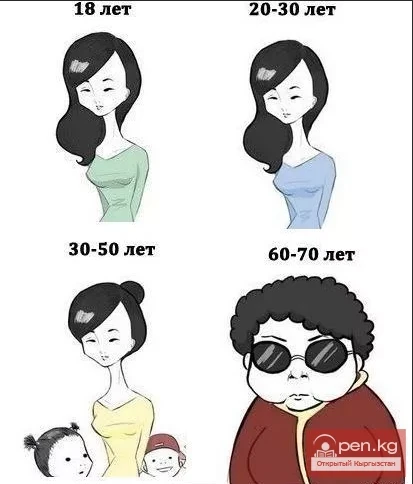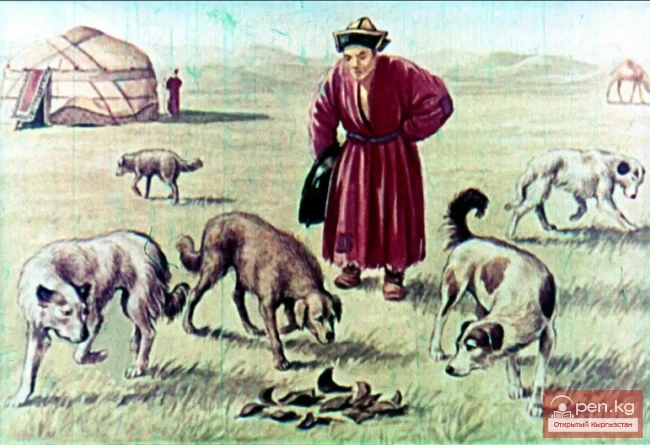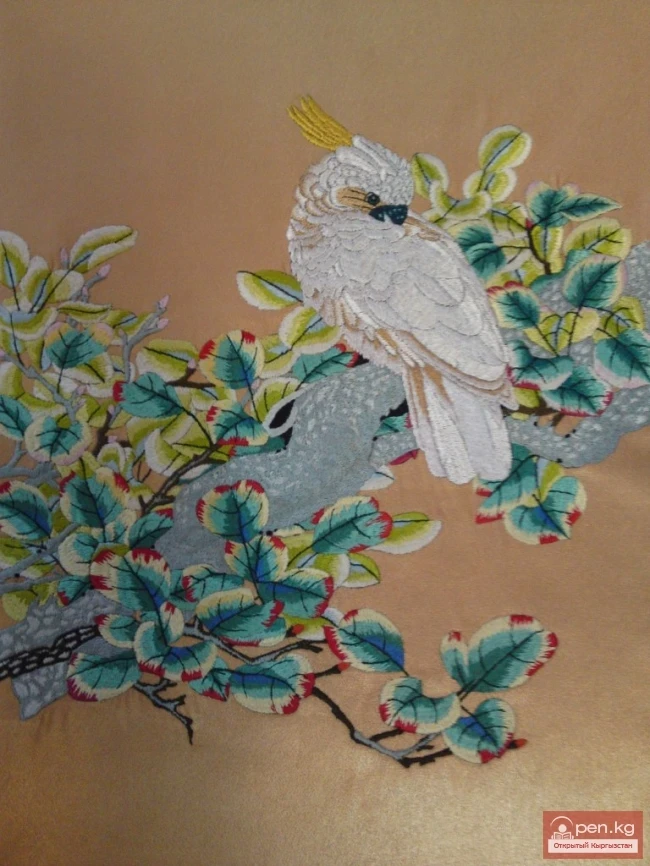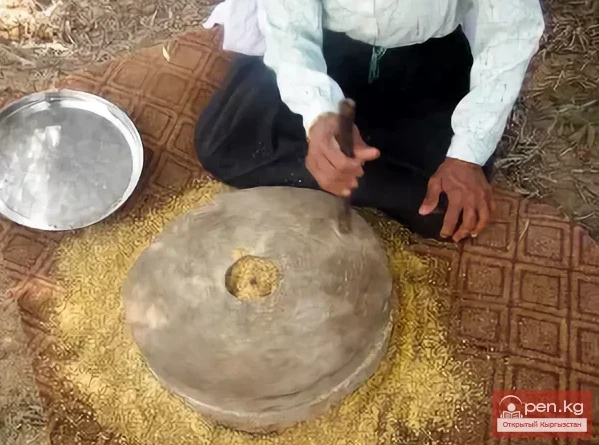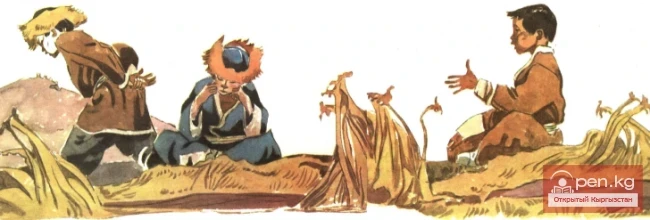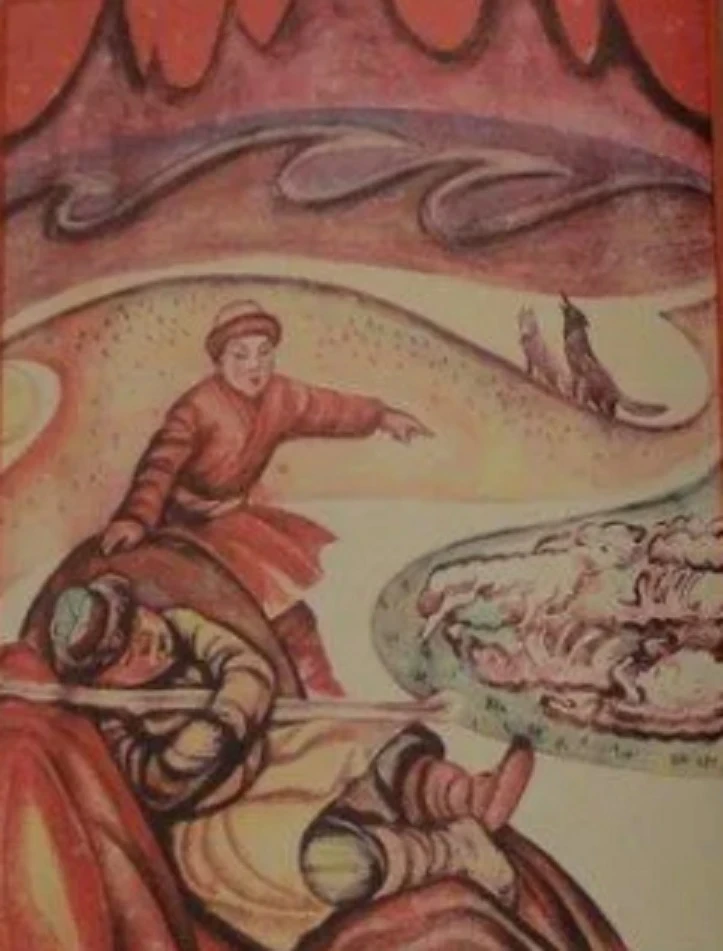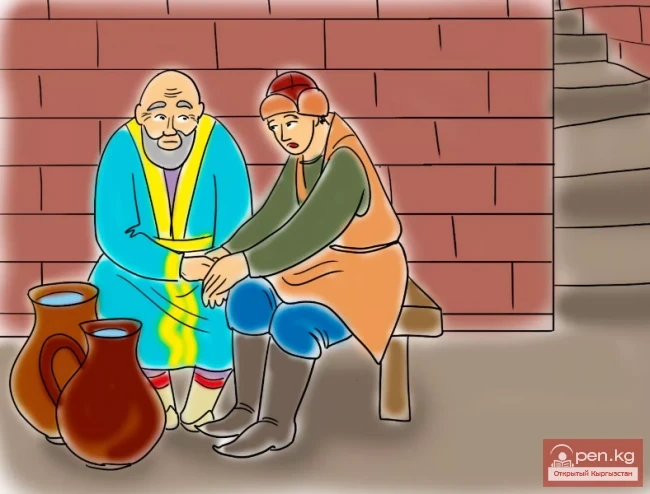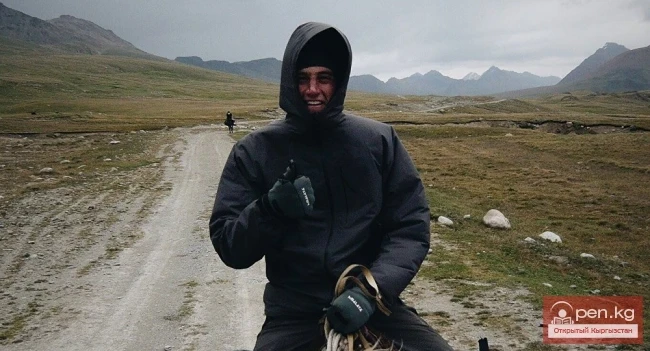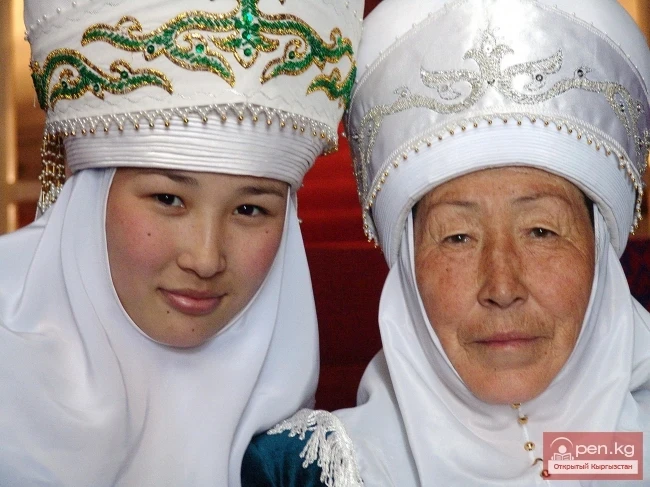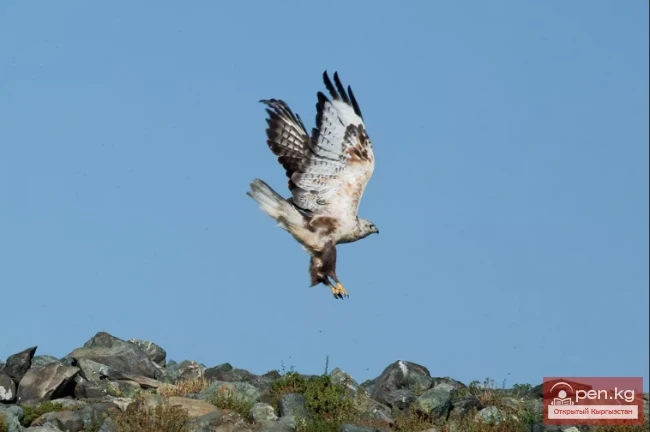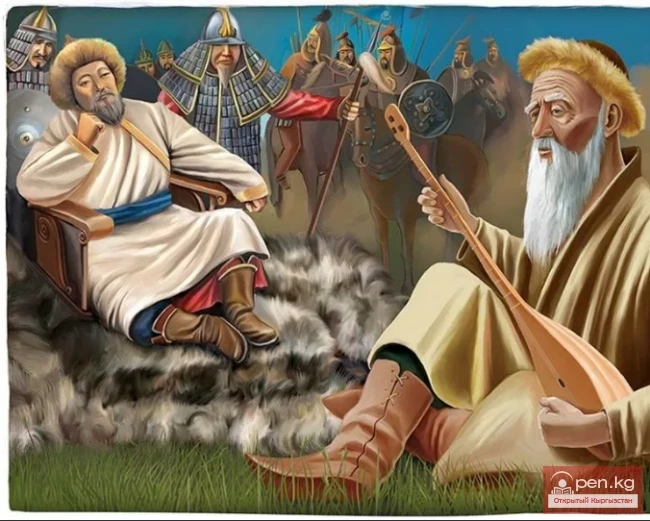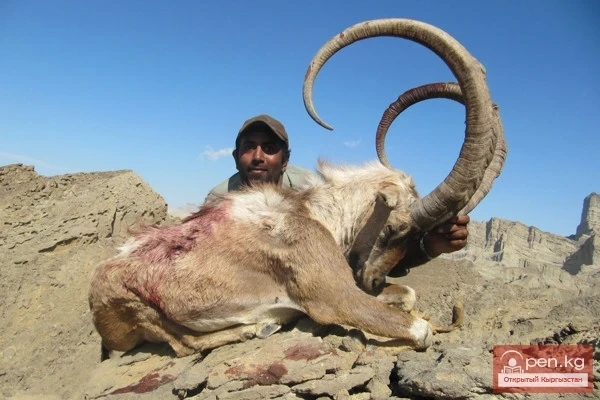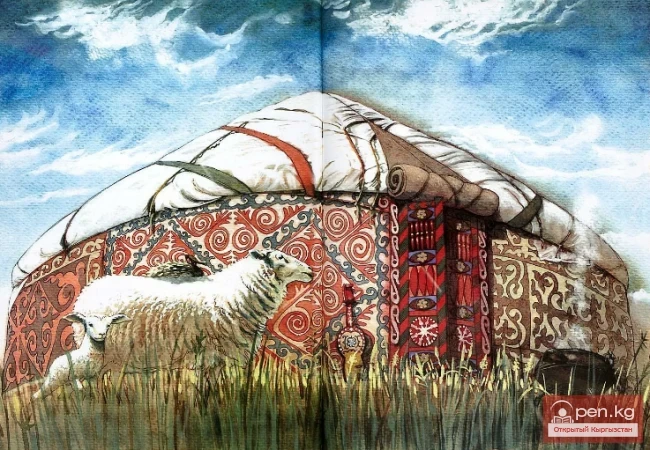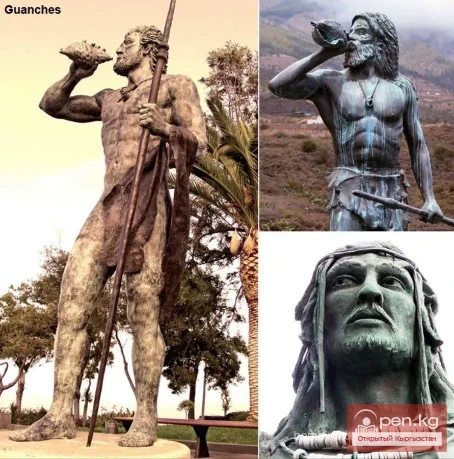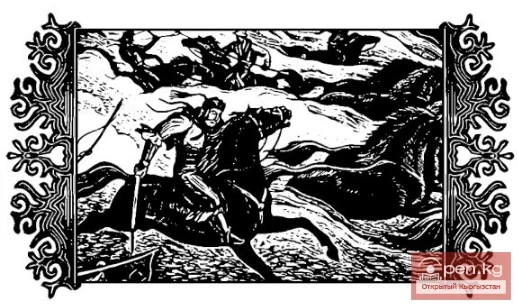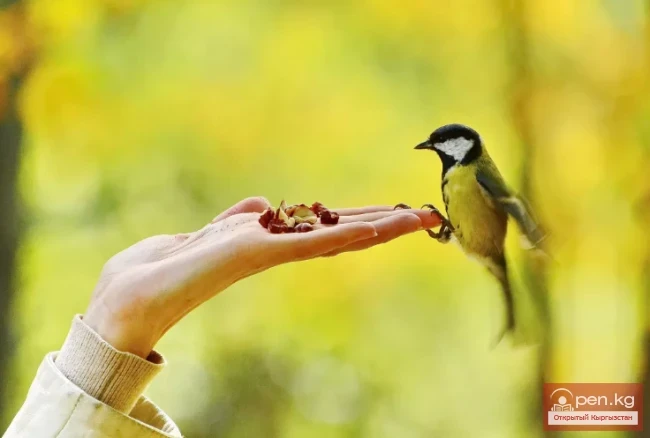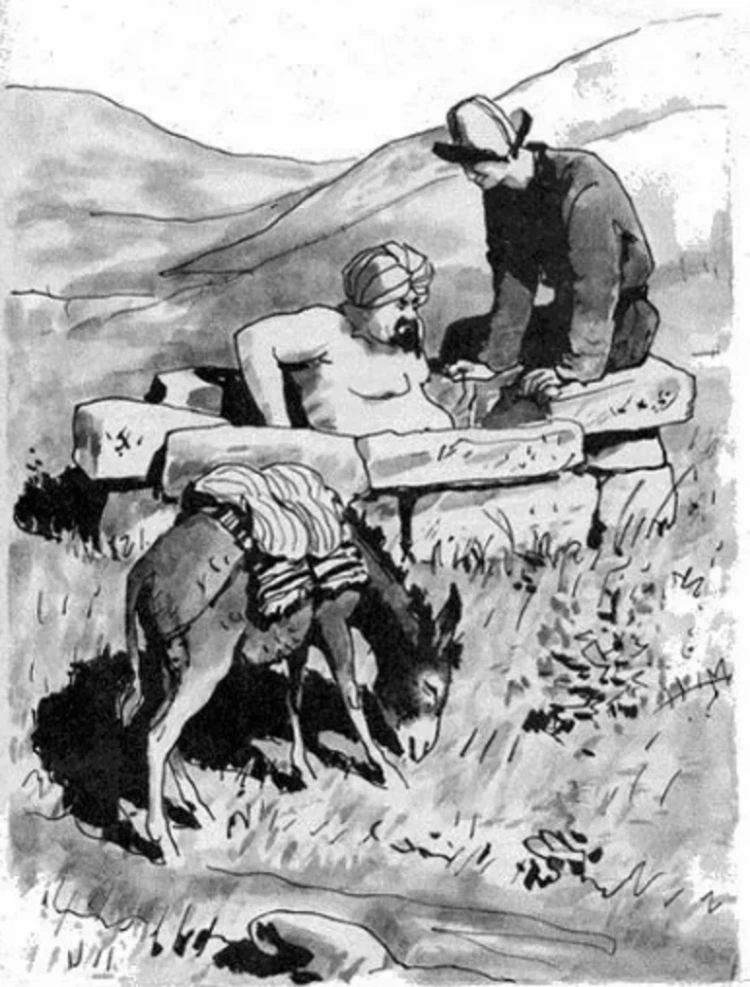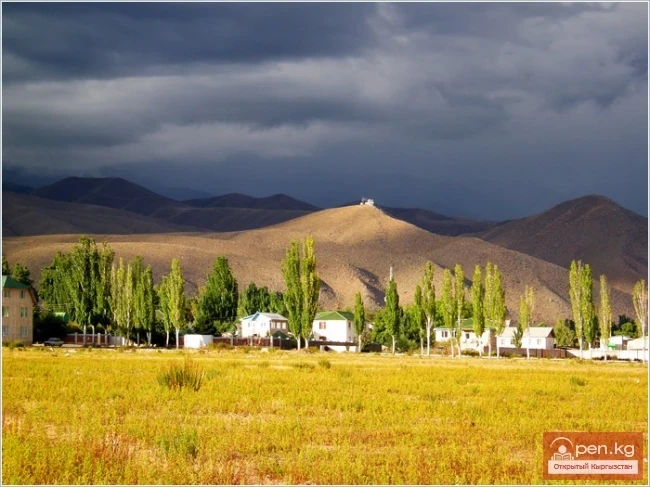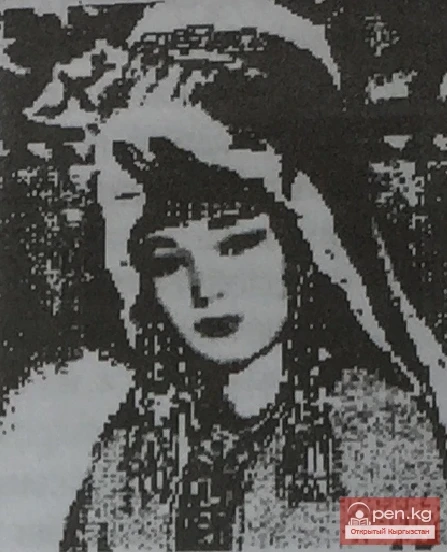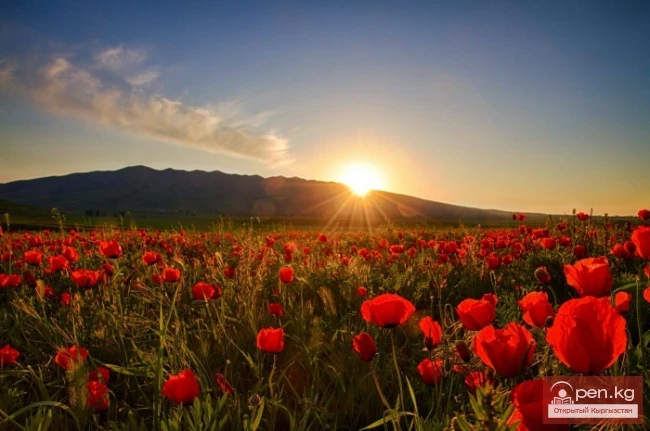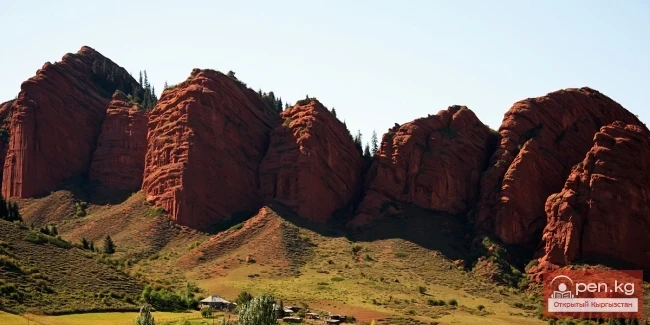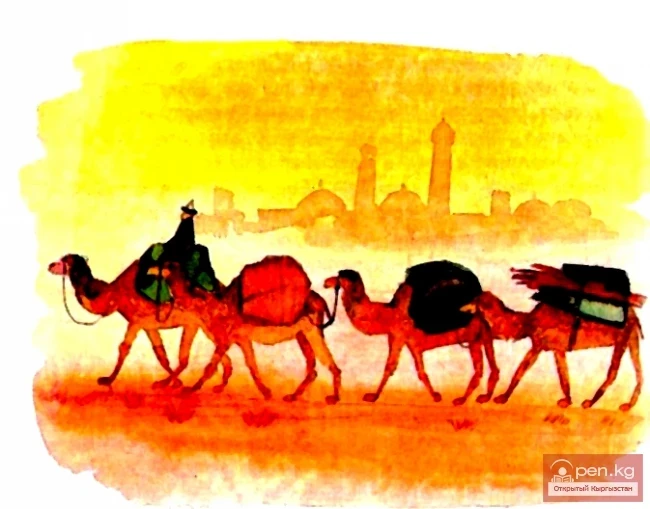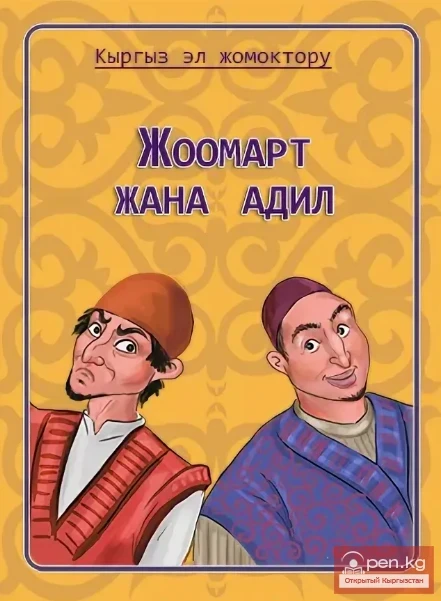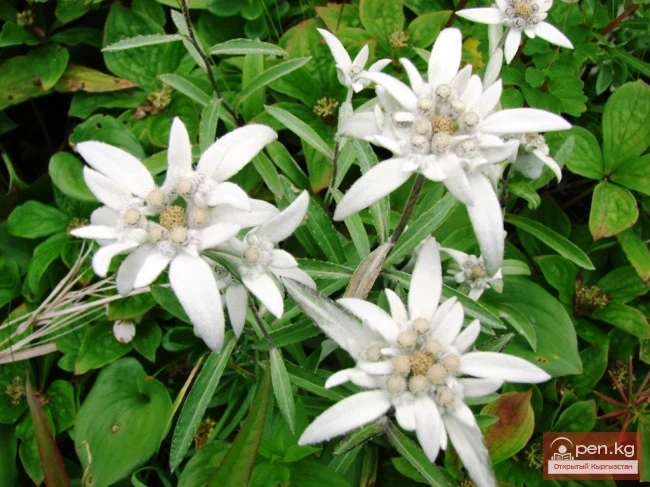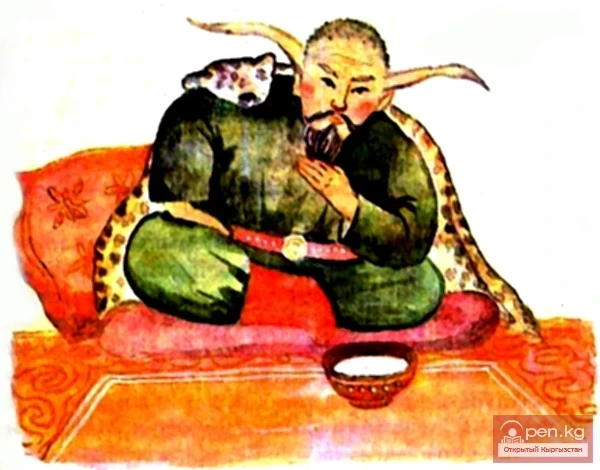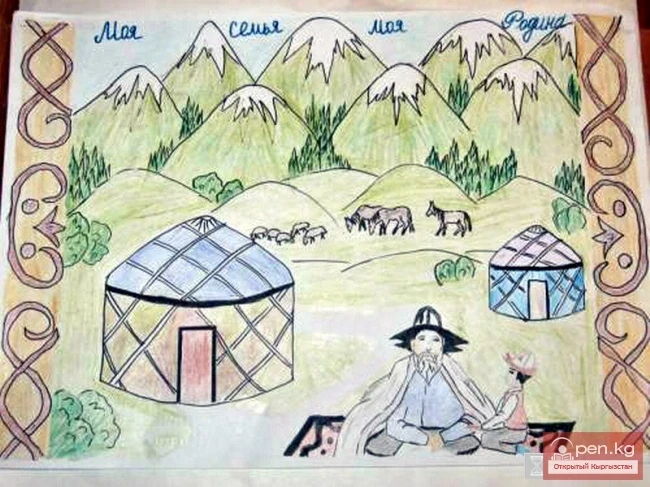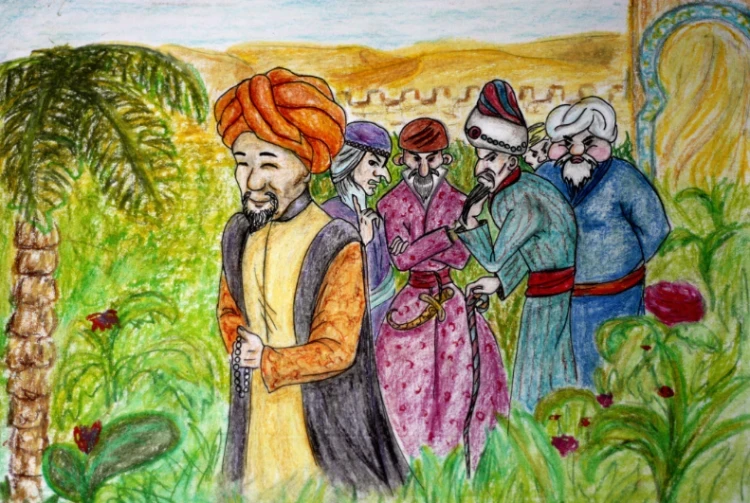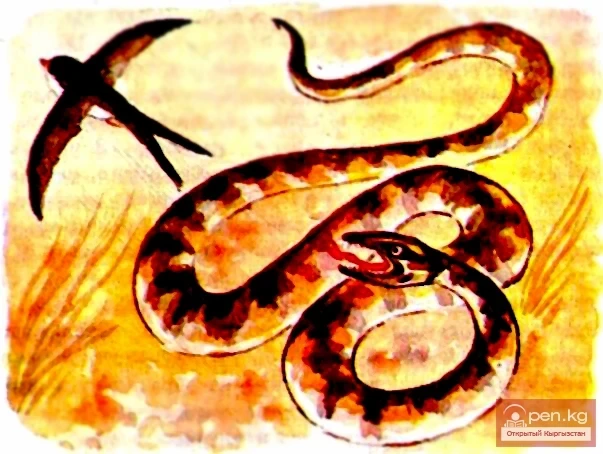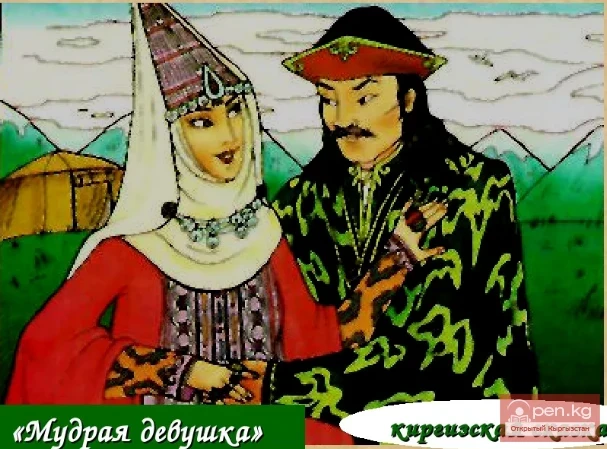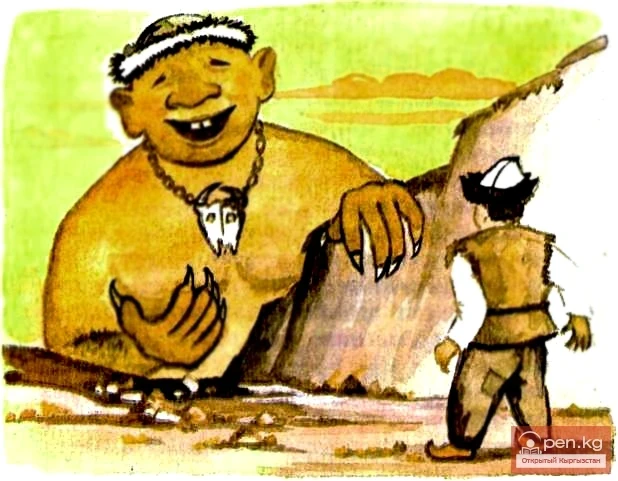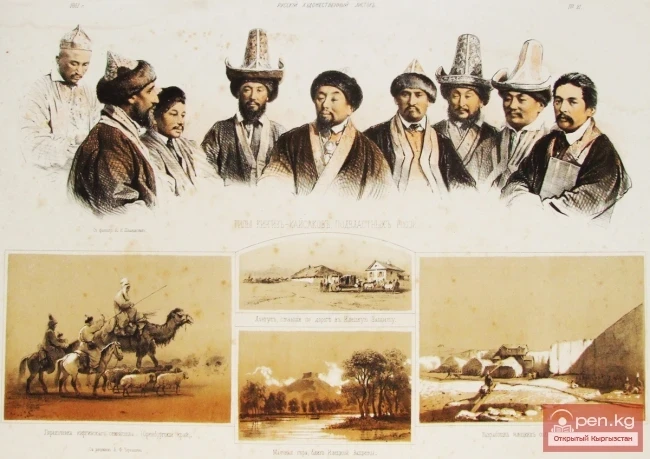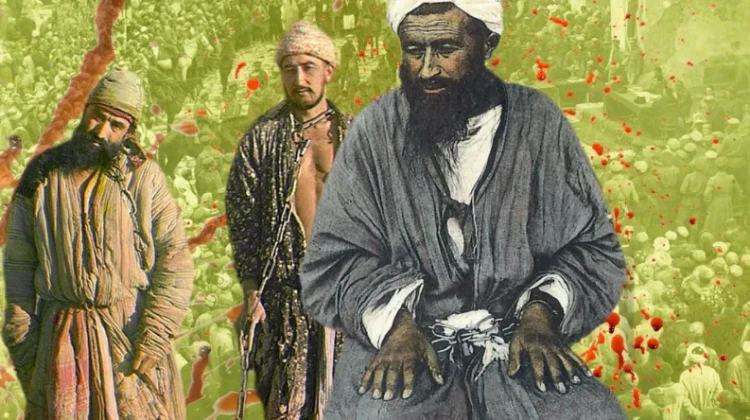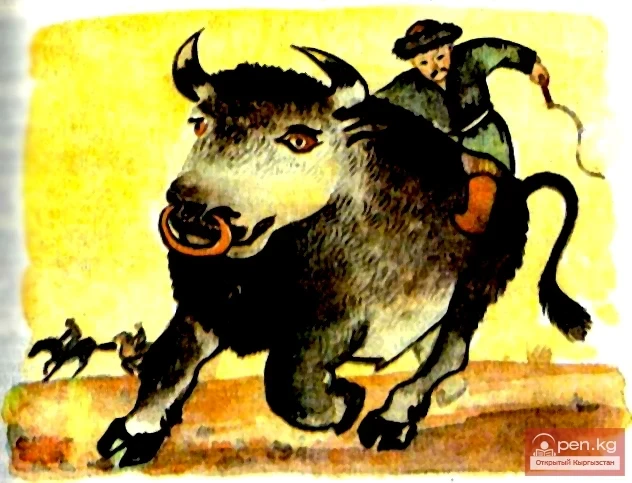
Even in ancient times, the necks of tricksters were long, and male pheasants wore an astonishingly bright red-gold outfit. Even then, some people were luckier in life than others; some accomplished their deeds through strength, while others did so through wit.
In those times, there lived two friends, both named bai. One was called Kegeden-bai, and the other Kyochpes-bai. Kegeden-bai did not like to stay in one place. He roamed the mountains and valleys all year round, sometimes returning to the jailoo — the summer pasture of his friend — to live beside him for a month or two.
But it must be said that Kegeden-bai roamed not just to be on the move, to see new lands and camps. No. He had one and only son named Chyntek. The father taught him various trades on the road and was not ashamed to seek help from shoemakers, tailors, sorcerers, and healers. And Chyntek grasped everything quickly because he was a very clever and smart boy.
Kyochpes-bai was a completely different man. In winter and summer, the bai remained in one place and taught his two sons — Eshpirg and Keshpira — to lead a sedentary lifestyle.
Kyochpes-bai had an enormous herd of livestock, but he often decided to slaughter animals (otherwise, there would be too few) and did not allow his sons to ride horses and camels (or they would lose weight and die).
Kyochpes-bai had a bay stallion that he rode daily to inspect his numerous herds and flocks. Every morning, the bay would approach the yurt, like a diligent dog, and Kyochpes-bai would go wherever he pleased.
No one grazed his livestock. All the animals — camels, horses, cows, sheep, and goats — grazed by themselves, never straying; they returned home to sleep at night and went to pasture in the morning, as if by magic.
This continued for several years...
When Chyntek turned sixteen, suddenly, one after another, his parents died, and he was left an orphan. By that time, his father had neither property nor home. Mourning the old folks, Chyntek remembered his father's friend, Kyochpes-bai, and went to him. Kyochpes-bai accepted the young man without much warmth and on the second day made him clean the stables, removing the manure that had piled up into mountains — after all, there were thousands of heads of livestock.
On the third day, Kyochpes-bai, as usual, returned from the pastures late in the evening, dismounted from the bay, and ordered Chyntek to take off the saddle, unsaddle the horse, and lead it to the night pasture.
Chyntek did everything as the master commanded. But for some reason, the horse did not want to go to pasture. The young man tried to urge him on: "Come on, dear, why are you standing there? Go to the pasture, to your herd." The horse remained in place, as if rooted to the ground. Chyntek grew angry and struck him with the bridle. The bay reared up, and, kicking up a cloud of dust, galloped off in an unknown direction.
In the morning, the bay did not come to the yurt. On the second day — neither. The master began to suspect something was wrong.
On the fourth day, as he was getting ready for bed, Kyochpes-bai said to his household:
— Go to sleep. In the morning, everyone will tell about their dreams, and we will try to interpret them. Perhaps the mystery will become clear.
— Okay, father, — said Chyntek. — But I will interpret the dream. I have been good at it since early childhood.
— Alright, Chyntek, — agreed the master. — Let it be as you wish. And now, as they say, the morning is wiser than the evening.
Everyone went to sleep. The night passed quietly, and there was dead silence behind the yurt's felt. So, once again, no animal came to sleep.
In the morning, as always, Chyntek was the first to wake up. He scooped out the ash from under the cauldron, brought dry dung, quickly and skillfully kindled a fire, poured water into the cauldron to prepare warm water for the owners to wash.
Soon everyone woke up. They washed up and sat around the hearth. Outside, autumn was in the air, it was cold in the yurt, and the people, who had just left their warm beds, shivered.
— Well, what did everyone dream about? — Chyntek asked the household. — Father, tell your dream first.
— I seemed to be sitting on top of a hill, watching over numerous domestic animals, — said Kyochpes-bai.
— And I, with a wooden bucket in my hands, seemed to be milking mares. But they, the wretches, did not want to give me their milk. There were so many foals! You couldn't see the end of the tether. A whole bunch of foals! — sighed the bai's wife.
— My dream is similar to my mother's, — said the eldest son Eshpir. — I became the chief herdsman, and it seemed that the horses in the herds were well-fed, shining with fat, and all belonged to me.
— And I was a shepherd in my dream, — said Keshpir. — There were so many sheep that I couldn't manage to go around the flock in a whole day, and it seemed that all the sheep and goats belonged to me.
— Is that all? — Chyntek asked everyone.
— That's all, — replied the master.
— Then it is like this. Father, in the future, you will have to sit on the hill and watch over the livestock of some bearded bai. You, mother, with a wooden bucket will be milking the mares of that bai. And you, two brothers, will be herding the horses and sheep of this greedy man. And he will not pay you a penny for your work. I will be the luckiest of all. I dreamed that the Sun was shining in front of me, and the Moon behind me. I was going somewhere, illuminated by their rays, and it was so bright around that I could see every blade of grass and every grain of sand under my feet. May our dreams come true! I bless them. — And Chyntek, with his palms shaped like a boat, ran them over his face from top to bottom.
— No, we cannot expect anything good from such a young man! — shouted Kyochpes-bai. — He has deprived us of all our livestock and left us in poverty. Catch him! Grab him! Let's cut him open and roast his liver over the dung fire!
With these words, the bai jumped to his feet to catch Chyntek. But he was sitting close to the exit of the yurt and was the first to dash out the door. Eshpir and Keshpir rushed after him with clubs in hand.
The chase did not last long. The two brothers turned out to be quite nimble beasts. They caught up with Chyntek. He pleaded:
— Brothers, — he said, — do not take me back to the yurt. Your father will kill me. You see how angry he is. Am I to blame for his bad dream?! Please, let me go in peace. I will go out into the world to seek my happiness. If I find it, I will not forget you. I will respond to good with good, and rescue you from this life of poverty... And here comes your little black puppy. Hurt his paw with a thorn so that blood comes out. Stain my shirt with his blood and take it to your father. Tell him: "Look, we killed Chyntek." He will calm down. And the puppy's paw will heal quickly on its own; dogs know how to heal wounds with some herbs known only to them.
Eshpir and Keshpir liked how Chyntek reasoned. Having done everything as he advised, they let the orphaned young man go, and he went on his way wherever his eyes led him.
He walked for three days and three nights. He tried to fly like a sparrow, but his wings quickly grew tired. He easily jumped over ditches, rivers, and ravines — a skill he learned from jumpers when his father still led him through the mountains and valleys.
In a deserted place, he encountered a huge flock of sheep. He passed through the animals. In another place, a large herd of spotted cows blocked his path. He walked through them.
In the third place, he met camels. And he passed among them without stopping. He also passed between a herd of horses. And he did not see a single shepherd anywhere. All this greatly surprised him.
In the distance, something white appeared, resembling a yurt. Chyntek quickened his steps. It was indeed a yurt. He cautiously peeked through the gap between the felt. He saw an old man and an old woman sitting in the yurt, very, very thin and pale, without a drop of blood on their faces. They looked like two drying stems of wormwood.
They sat silently, as if mute, and did not look at each other. Suddenly, he saw a wooden bowl slowly descending through the tünduk, filled with roasted entrails of a ram, and such an intoxicating smell wafted from the roast that Chyntek, who had been starving for these days, even drooled.
The old people, feeling the bowl with their hands, began to eat the roast.
"What’s wrong with them? — thought Chyntek. — Are they blind?"
Stepping silently, Chyntek entered the yurt. Ensuring that both hosts were blind, Chyntek sat down with the old people and began to eat the roast with them.
"Why and when did they go blind? — thought Chyntek, devouring the delicious roasted heart, kidneys, liver, and lungs. — Who sent them food? Perhaps they are connected to sorcerers?" Together, they quickly emptied the contents of the bowl.
— Old woman, it seems you ate more roast than I did, — said the old man, feeling the empty bowl.
— No, old man, today you ate more roast than yesterday, — the old woman mumbled with her toothless mouth.
The old man silently stood up and, holding onto the yurt's frame, as a blind person should, quietly walked to the threshold.
— If you are telling the truth, then there is a third person in our yurt. I will stand at the threshold, and you search all the corners of the yurt.
So they did: the old man blocked the exit with his body, while the old woman began to feel around the yurt, stretching her hands out in front of her.
"If they catch me, they will probably cast a spell on me and turn me into a donkey," — thought Chyntek, dodging the old woman. But where can you hide in a round yurt?
He tried to slip past the old man. But it was no use. The old man grabbed him with his wiry hands, like a vice, with a dead grip.
— Oh-oh-oh! — Chyntek screamed in a voice that was not his own. — Grandfather, it hurts! Let me go.
— Old man, do you hear, he has a child's voice. Be careful! Don’t hurt him! Otherwise, you might scare him, and he will be left a stutterer from fear. Bring him here, to the red corner. Perhaps he will tell us who he is.
— Who are you? — asked the old man. — A boy or a girl? Where did you come from and where are you going?
— I am a teenager, grandfather. An orphan. I wander the white world looking for my happiness. If possible, I can stay and live with you.
And Chyntek, without hiding anything, told everything about his short life. After listening to him, the old people let him live with them instead of a son. He began to do everything around the house. One day, Chyntek went to gather firewood in the grove that grew along the riverbank.
— It’s time to check on Chyntek, — said the old man to the old woman when they were alone. — On the way here, he must have seen our livestock. First, he passed through the sheep, then through the cows, camels, and finally, the horses. He could not have failed to notice that all the livestock grazes without a shepherd. I wonder what he thought about this?
Soon, Chyntek returned with a bundle of dry twigs on his back. He lit a fire in the hearth.
— Son, what did you see on the way when you first came here? — the cunning old man asked cautiously.
— I saw a large flock of sheep, which is not herded by a person, but by a huge white horned bull. Then I encountered a herd of cows with a black bull at the head. Then I met camels with their leader — a giant dark brown camel. And finally, I saw a large herd of horses, and among them was a bay stallion.
— That’s right, old man, that’s our son! — the old woman rejoiced.
— You are right, old woman. Allah himself sent us this young man. So, son, the livestock you saw is mine. Now it belongs to you. Take care of this livestock and watch over us. As you can see, we have grown old. Go to the herd of horses, catch any horse you like, get on it, and ride to the northern mountains, where the Great Bear shines. There, on the green meadow in the gorge, you will see fine racehorses grazing. Each one is more stately and beautiful than the other. Catch any racehorse. It can gallop day and night without knowing fatigue. I warn you, there is a gray stallion in the herd. He is the only one, light gray. Do not catch him. You must not ride that horse. And if, out of youth, curiosity, or mischief, you still want to get on him, then ride here to us, screaming. Otherwise, you will perish before your time.
Chyntek, having saddled the horse, without a saddle, climbed up the gorge into the mountains. The horses grazed here scattered. The young man gathered them all together. He counted them. Exactly sixty. All stately, lean, and slender, like swans on the surface of a lake. They were only for admiration. And here was the Gray. Oh, he turned out to be more beautiful than all. Chyntek had never seen such a graceful horse. Stunned, he stared at the beauty for a long time. The other horses no longer interested him.
"What will happen if I saddle him? Will he throw me off? Let him try! I am not one of the weak riders. I will quickly knock the pride out of him!" And Chyntek disobeyed the old man, forgot his warning — curiosity took over.
The Gray did not run away from him. He fussed a bit, circled around, and allowed himself to be saddled.
At first, the Gray walked in a pace, then galloped, and then practically flew. In the time it took for the water to boil in the cauldron, Chyntek managed to ride all the mountains. The ground thundered under the hooves of the steed.
— Ah, the rascal did not listen to me, — the old man lamented in the yurt. — He has saddled the Gray. How will he not throw him off at a gallop? After all, the horse flies at the speed of the wind. Not every rider can stay on such a hot horse. May the Creator protect him.
At that moment, a loud cry of lamentation was heard: Chyntek had returned. Jumping off the Gray, he tied the horse to the hitching post and entered the yurt.
— A-a, my son has come! — the old man rejoiced. — You did well to heed my second advice. Many have tried to ride the Gray, but all perished... My horse obeys only a shout. And you have a loud voice. The Gray will listen to you. From now on, the horse is yours. I am old, and I cannot manage him. Here is another piece of advice for you. In our mountains, there is a gorge. There is no other gorge as wide as that. Do not look into that gorge. There lies great danger for you. If you ride into the wide gorge, you will perish not only yourself, but our death will come as well. And you still have much life ahead of you. It is better to take care of the livestock. It will be enough for you for your whole life. And there will still be enough left for children and grandchildren...
For several days, Chyntek did not think about the wide gorge. From morning till evening, he rode around his flocks and herds, driving away predatory beasts and birds. But one day, he suddenly remembered the old man's words. "The old man said not to saddle the Gray, otherwise, something bad will happen to me. I saddled the horse, and nothing happened to me. I wonder what secret is hidden in the wide gorge? On the way here, I passed many gorges. They all look alike. But what is special about the wide gorge? I should take a look."
And Chyntek, without thinking long, directed the Gray into the wide gorge. The horse swiftly carried him to the gorge. It appeared wild to him. Thick thickets of meadowsweet, barberry, wild rose, and willow intertwined with long flexible vines, resembling snakes. Wild animals roamed everywhere: deer, argali, and wild goats... The paths belonged only to them; Chyntek did not see a single trace of a human anywhere.
He climbed to the very top, where the steep mountain cliffs began, and was about to turn back when he suddenly noticed a thin stream of blue smoke. Looking closely, he saw that the smoke was coming from a white yurt set down on a green meadow.
Chyntek quickly galloped to the yurt and, dismounting, boldly entered it. He saw an ancient old woman sitting there, and all her decorations — beads, necklaces, earrings, bracelets, and even her clothes — were like those of a young girl ready for marriage.
— Aha, my Chyntek has come! — the old woman-girl rejoiced. — I have been waiting for you, thinking whether I should go myself, and you have appeared. Good. Good. I will have a splendid breakfast. I will drink, drink, finally, your hot blood. Come, come here. Where has my sharp knife gone? I will quickly deal with you.
Chyntek did not wait for the old woman to find her sharp knife and slaughter him like an innocent sheep. Drawing his knife, he lunged at the villainess. He knocked her to the floor and pressed the knife to her throat.
— Tell me, who are you?
— Do not kill me, dear Chyntek. I am a lonely, poor old woman, without care, without attention. But even though I am poor, I feed the old people with whom you live.
"Strange, — thought Chyntek, — how can she feed my old people if she can barely stand on her feet? No, something is not right here. Most likely, she is the very sorceress who sends the old people either the roast in the bowl, or cream in a wide silver vessel, or strong tea in the samovar every day. I need to interrogate her."
— You are lying! — Chyntek said sharply. — If you do not tell the truth, I will not care that you are old. Apparently, you are the very evil force that instills fear in everyone.
Chyntek appeared to the old woman as a formidable, uncompromising enemy. She trembled all over, her heart rose to her throat, and her eyes were ready to pop out of their sockets.
— Spare me, Chyntek, do not kill me, — the old woman pleaded. — If you leave me alive, — she resorted to trickery, — I will return the sight to the old man and old woman who adopted you.
— How? So it was you who deprived them of their sight? Where are their eyes? — And he slightly pricked the old woman's throat with the knife's tip.
— Oh-oh-oh, it hurts! — the old woman screamed. — What are you doing to me? I want to live.
— Where are the eyes?
— In the chest. The old man's eyes are tied in a white cloth, and the old woman's eyes are in blue.
— And how do I put them back in place?
— For this, you need to say three times: "The old woman has avenged you. She forgives you all past wrongs. May your eyes be sighted again." Insert the eyes into the eye sockets and gently stroke them.
— Why did you punish them so cruelly? What wrong did they do to you?
— Oh, that is a very long story. Put down the knife, and I will tell you everything.
But Chyntek did not think of letting the sorceress go. He pressed down on the knife's handle again.
— Oh-oh-oh, I will die now, and you will not learn anything about your old people. Stop poking me with the knife... It happened a long time ago. The old man you live with now is named Tabish-batyr. Once he was a true batyr, and his fame spread far across the land. One day, seeing him, I fell in love. But Tabish did not pay attention to me and married Salkyn, the current old woman. Of course, back then we were all young, cheerful, and beautiful. I waited many years for Tabish to leave his wife and marry me. Alas, that did not happen. Then, deep in the night, I sneaked into their yurt and tore out their eyes. If he had said then, "Return my sight, and I will marry you," — but... You see, I still keep their eyes and wait for Tabish to come to his senses. But all in vain... I have to feed them. Otherwise, they would have starved to death long ago...
— From now on, they will not need your help. I will feed them myself. And for your wickedness, die, — said Chyntek and struck the old woman with the knife.
— Oh, how I was wrong! I, a fool, should have taken you on sooner. Oh! — with these words, the old woman breathed her last.
Chyntek, leaving her body alone, kicked the chest three times with his foot and knocked the lid off. Indeed, in the chest lay white and blue bundles; unwrapping them, Chyntek saw the eyes. Jumping on the Gray, he cried out and rushed back home: only when he cried out so loudly did the Gray gallop to the yurt; otherwise, he would turn in another direction and could throw his rider off the saddle.
— Hey, grandfather! Hey, grandmother! Come out here quickly!
I bring you joyful news! — Chyntek shouted at the yurt.
— What happened, our joy? — the old woman was the first to appear from the yurt. Chyntek unwrapped the blue cloth, took out the eyes, inserted them into her eye sockets, and gently stroked them, saying: "The old woman has avenged you. She forgives you all past wrongs. May your eyes be sighted again."
— Oh, Creator! I see again! — the old woman cried joyfully. — Thank you, my son. You have returned my sight. May you live long in this world. And what about the old man's eyes?
— I brought them too, grandmother. Here they are. I will insert them now. Where is he?
— Here I am, here, my son. I’m coming! I hear joyful news, — the old man came out of the yurt. Chyntek inserted the eyes into him as well. They could hardly believe that they could see everything again that a normal person sees. Chyntek told them what had happened.
— I see you are a brave jigit, — said the old man. — Thank you. At least in the last days of our lives, we will see the sun, the stars, the forest, and the mountains. We have seen you as you are. Live many years, may you have your own children, and may your children have children... May your lineage, your tribe, and your people be eternal!
Tabish-batyr was moved and told about his life.
He was the first warrior of Kyzyl-khan and defended his tribe from the raids of Kara-khan. They lived on the right bank of a wide and full-flowing river; there was no bridge across it, and only two or three people from the Kara-khan tribe, which occupied the pastures on the left bank of the river, knew about the ford.
Since the time Tabish-batyr went blind by the will of the sorceress, the people of Kara-khan raided once a year, stealing livestock and taking beautiful girls and young men into captivity. Kyzyl-khan tried to retaliate, gathered an army, but each time returned without finding a ford across the river.
— Perhaps Kyzyl-khan will prepare for a campaign this year, and you, my son, will have the opportunity to participate in it. Help him and know that this is your tribe, for I fought for it all my life. Take my place with dignity. You have a good talking horse; he will help you in everything, rely on him...
And so it happened. One day, Kyzyl-khan gathered for a campaign again. A multitude of horsemen gathered. They approached the river and stopped.
— Who knows the ford across the river? — the khan asked his warriors. — I hope that over the year at least one clever person has grown up who knows the ford? Is there such a person?
The warriors remained silent.
— Or perhaps someone stayed in the yurt? Did not come here? — asked the khan.
— It seems everyone has come, esteemed khan. Unless, of course, we count the foolish adopted son of Tabish-batyr! Hardly he is good for anything. But they say he has come, and old Tabish and the old woman have regained their sight, — replied the khan's first vizier on behalf of everyone.
— Then bring him here. Maybe he knows about the ford. If he refuses, tie him up. I command!
Two khan's viziers galloped to the old people's yurt, where no human eye had looked for a long time. They informed Chyntek of the ruler's command.
— I have no horse, — Chyntek pretended. — All the khan's warriors are on horseback, and am I to be a foot soldier alone? If you want me to go to the khan, gallop into the gorge; there, a herd of horses is grazing. In that herd, there is a Gray stallion. Try to lasso him. If you cannot do that, go to the hungry steppe. There, a herd of camels is grazing. Catch me the largest male of a reddish-bay color. If he does not yield to you, go to the sunny valley; there, a herd of cows is grazing, among them walks a large black bull. At least bring him, and I will go to your Kyzyl-khan.
The viziers hurriedly galloped in the indicated direction. But they could not lasso either the Gray stallion or the male camel. On the contrary, the animals nearly injured them with their hooves and teeth; the viziers barely escaped with their legs.
The viziers only managed to catch the black bull. And it was on him that Chyntek appeared before the formidable khan. Meanwhile, he was looking for his battle armor, which he had forgotten in a hurry at the palace.
— The armor is with my daughter, — said Kyzyl-khan. — Whoever brings them here faster than anyone else will take my daughter as his wife.
Many wished to marry the beautiful khan's daughter, and they all galloped to the palace. Chyntek rode on the bull. Everyone laughed at him: "Where are you going, fool? You rode on a bull; will you be back soon?"
But Chyntek, falling behind the horsemen, turned into a hollow and raced through it faster than the wind. He far outpaced all the horsemen; one of them met him on the way back when Chyntek was already galloping back with the khan's armor.
— Hey, fool, — said the horseman. — Are you really carrying the khan's armor? Give them here. Why should you deliver such a precious thing to the khan? What khan will give his daughter to you, a half-wit? Our Kyzyl-khan is still in his right mind. — And the horseman, snatching the choptuk — the armor — from Chyntek, sped off to the khan.
But Chyntek, hiding the black bull in a ravine, turned into a sparrow — he had mastered this skill since childhood, but rarely used it — flew over the wide river and landed on the yurt of Kara-khan. The daughter of Kara-khan, Erke, which means Tenderness, was standing by the yurt at that moment, looking at the numerous horsemen crowding on the other bank.
— Father, why have the people of Kyzyl-khan gathered? — she asked her father. — What do they intend to do?
— Ah, my daughter, I have known their intentions for a long time. Kyzyl-khan is looking for a ford to cross the water barrier and attack us. But they will not find the ford, no matter how much they search.
— And how do you cross the river? — Erke asked in surprise.
— Do you see where the horsemen of Kyzyl-khan are crowding? Now look upstream. There, in the distance, stands a lonely poplar. Do you see it? That is where the river spreads wide. In this place, if you take it diagonally, you can cross the river. But the people of Kyzyl-khan do not know about this ford. We have crossed to the other bank several times on dark moonless nights...
— And if the horsemen of Kyzyl-khan find that ford and cross over here? What will happen to us, father?
— Nothing will happen to us. The sheep will turn into their small, bean-sized pellets; the cows will turn into "flatbreads," the camels into their large pellets — korghool. The expensive fabrics in the yurts will become rags that no one will even look at. You will turn into a flower. I will turn into a mangy goat, and your mother into a scabby goat. Let them drive away their herd of horses; for us, it is like a breath of wind. We will not lose anything.
Chyntek the sparrow, having listened to Kara-khan, flew over the river, turned back into a man, sat on his black bull, and led the army to the lonely poplar. They easily overcame the water barrier and soon were on the other bank. No one resisted them, as if everyone had long since died out. Only the pastures were grazing the herds of Kyzyl-khan, stolen the previous year. The horsemen began to drive the livestock to their bank, while Chyntek quietly snuck into the yurts of Kara-khan. And here, too, there was not a single living soul. Sheep, camel, horse pellets, and cow "flatbreads" lay everywhere. Instead of the khan's yurt, which he had seen recently, there were only some rags, tatters, and scraps. Among them grew a single flower. A goat and a she-goat wandered through the wasteland — mangy, with ragged wool and tearful eyes.
Chyntek silently gathered various pellets into bags, loaded them onto the animal, stuffed the flower into his pocket, and tied the goat and she-goat to the tail of his bull and rode back. Everyone who saw what Chyntek was doing laughed: "We thought that Tabish-batyr's adopted son was a clever one, but he is a fool. For some reason, he loaded dung into bags and is taking it home as if it were precious stones. He will surely delight the old people with sheep pellets from the camp of Kara-khan. Ha-ha-ha!"
But Chyntek did not even raise an eyebrow at the mockers. Returning to the old people's yurt, the first thing he did was light a large fire with dry twigs. And just as he was about to pour the sheep pellets into the flames, they turned into thousands of living sheep, bleating as they rushed to the pasture. The same thing happened with the camel, horse pellets, and cow "flatbreads." The entire vicinity was filled with the herds and flocks of Kara-khan.
Chyntek took the flower out of his pocket and was just about to throw it into the fire when it turned into a beautiful girl named Erke.
— Oh, batyr, do not destroy me! — cried the khan's daughter. — Do you want me to become your wife?
— Well, let it be as you wish, — Chyntek said, smiling. — In joy, I will treat you to goat meat. True, this goat and she-goat are quite mangy, but I have heard from people that they have very tasty meat. It just needs to be boiled longer. Well, I have gathered enough firewood. Let it boil until evening.
And he took up his knife to sharpen it.
— Do not kill us! We will serve you faithfully and truthfully, with body and soul! — the goat and she-goat spoke in human voices and immediately turned into Kara-khan and his wife.
Tabish-batyr and his wife Salkyn watched the events with astonishment and could not rejoice enough, looking at their adopted son.
— No one has ever defeated me, — said Kara-khan. — But you have surpassed me in everything, Chyntek. Take our daughter Erke as your wife and consider us your parents. Everything you command, we will execute unconditionally.
Chyntek restored Kara-khan's yurt from rags and began to live in it with his wife, just as he had lived on the other side of the river. He held a wedding with Erke and set up a separate yurt.
A few days later, the herdsmen brought a large herd of horses to Chyntek.
— This herd was sent to you by Kyzyl-khan for being the only one to find the ford across the river, — said the vizier accompanying the horses.
And a few days later, news spread that Kyzyl-khan was marrying his daughter to the horseman who had brought him the battle armor before the crossing.
— Here is your groom, my daughter, — said Kyzyl-khan to the people, pointing to the vizier who had taken the armor from Chyntek and delivered it to him.
— Father, I do not know who brought you the battle armor. But I did not give them to this man, — said the khan's daughter Syyada.
— Then let all the young men of the tribe pass before my daughter, — commanded Kyzyl-khan.
All the young men passed before Syyada. But she did not point to anyone with her hand.
— Who else has not come to our toy? — asked the khan.
— The son of Tabish-batyr, Chyntek, — was the answer.
— Bring him here.
Chyntek arrived at the khan on his black bull.
— It was he who took the choptuk from my hands, father, — the girl said without delay.
Kyzyl-khan did not want to give his daughter to a rootless jigit. But what could he do? He had given his word before the whole crowd, and it had to be kept now. And the khan, according to all the customs of the tribe, married Syyada to Chyntek; otherwise, he could lose the high khan's trust of the common people.
One day, Chyntek, getting up in the morning, remembered Kyochpes-bai, how he interpreted the dream, how the bai wanted to kill him and roast his liver. Remembering this, Chyntek burst out laughing.
— What made you laugh in the morning? — asked the young wives. — Tell us. Did you dream something? Or are you hiding some secrets from us?
— I have no secrets from you. A few years ago, something amusing happened to me. For some reason, it just came to my mind now.
And he told his wives how and why Kyochpes-bai almost killed him once. He told this to the old people as well.
— I miss my homeland very much, — Chyntek added. — I want to go and see what is happening there; please allow me to leave for a while.
Tabish and Salkyn, after thinking it over, allowed Chyntek to visit his native places.
The preparations were not long: Chyntek decided to go alone on his beloved Gray horse, which could replace him with ten good friends on the road. He rode hastily, energetically, not sparing his strength and the legs of the pacer.
Only at the end of the second day did Chyntek pull on the reins of the Gray and spend the night in an open field. He let the horse graze on the green grass.
In the morning, he woke up and saw the horse standing nearby, impatiently flicking its ears, snorting, in short, clearly worried about something.
— What’s wrong with you? — asked Chyntek, rubbing his eyes. — It seems you did not go to graze? What’s the matter, buddy?
— I am not hungry yet, — the horse replied in a human voice. — I am standing here thinking. We will ride further now. And on our way live two giant brothers. Karadyo — the black giant and Akdyo — the white giant. Both are your worst enemies. They possess terrible strength. You cannot defeat them. They can only be defeated with cunning. Expect trouble from them either now or on the way back. They are very observant; they see everything that happens in their domain, who passes by, who flies by. So be very careful.
— How can I defeat them with cunning? — Chyntek asked, puzzled.
— We will act according to the circumstances. For now, let’s go.
And the Gray, like the wind, carried his master forward. Soon a large black yurt appeared.
— This is Karadyo's yurt. We will be met by a barking puppy. He is a very cunning, all-knowing puppy. If he barks for a long time and goes wild, it means Karadyo is in the yurt, and you need to be very careful. If the puppy, after barking a bit, tucks its tail and immediately runs into the yurt, then the master is not home, and you can enter the yurt and see what is going on.
And that is exactly what happened. The puppy that ran out to meet them barked a little, like any foolish puppy, and disappeared back behind the felt.
"So, the master is not home?" — thought Chyntek and, dismounting, boldly entered the giant's yurt. At first glance, there was no one in the dwelling, only in a large cauldron — twelve arshins in circumference — meat was boiling. Chyntek was very hungry and was about to take a large piece of fatty horse meat from the cauldron when he was stopped by a strange sound, resembling a moan.
Chyntek began to carefully inspect the yurt. He saw a beautiful young woman tied by her hands and feet hanging from the ceiling. Her lips were pierced with a gypsy needle. Chyntek untied the woman, freed her from the ropes, and pulled out the needle.
— Who played such a cruel joke on you? — he asked.
— Who else but Karadyo, — replied the woman. — Five years ago, he forcibly married me. From the first day until today, I have not seen any good from him. I am not the mistress of this yurt — he rules everything himself. He brings the carcasses of horses, bulls, and deer. He cuts the pieces himself, lowers them into the cauldron himself, kindles a large fire, and leaves for a long time somewhere while the meat is boiling and roasting. And every time he ties me up, hangs me from the ceiling, like a piece of meat for drying. "This," he says, "is so you do not eat all the meat." And to keep me from screaming, calling for help, he pierces my lips with a needle. What a sad life I have, man. — The wife of Karadyo cried bitterly.
— Do not cry, dear aunt. If you want to escape from your husband, help me get rid of Karadyo.
— Of course, I have long dreamed of living among people, for I am of human descent. I would not live here for a single day. But what can I do — I am a weak woman?
— Karadyo is your husband. You probably know all his secrets and mysteries. Where does his soul hide? What is his strength?
— Of course, it is pointless to fight and wrestle with him. He is physically many times stronger. Karadyo can only be defeated with cunning. You need to steal his soul. It is kept in that iron chest, with forty chicks of a titmouse.
Chyntek pulled the chest out from under the bed, kicked it three times with his foot, and the lid opened. Indeed, there lay forty chicks. To weaken Karadyo's strength, Chyntek tore off the heads of thirty-nine, and the fortieth fluttering chick he tied by its legs to his belt and went outside. Just then, Karadyo appeared, as if he had risen from the ground.
— Do not kill me, man. I will be useful to you. Be merciful.
— Do not let him get close to you. He will kill you! Do not believe his words. He is very cunning! — shouted the Gray horse in a human voice.
Chyntek instantly tore off the head of the fortieth, the last one. And Karadyo fell dead from the saddle to the ground at Chyntek's feet.
— Dear lady, I am leaving, — said Chyntek, — wait for me. I will return and take you to my fellow tribesmen.
— Alright, dear traveler. I will wait... Go. But know that on your way, you will meet Karadyo's younger brother — Akdyo. He is more treacherous and more evil than my now-deceased husband. When you see his wife, send her my regards. She is my younger sister, named Kyial — Dream. Tell her that her elder sister Zhaydery — Cheerful — is now truly cheerful; she has rid herself of her tyrant... Give her this ring.
And Chyntek rode on. Soon he saw a large white yurt in the steppe.
— Akdyo lives there, — said the horse in a human voice. — You will be met by a white puppy. If he barks, it means your affairs are bad. If he tucks his tail and immediately runs into the yurt, then go in boldly and act according to the circumstances.
They were met by a white puppy. He barked so loudly as if he would never stop. But Chyntek was not afraid and boldly entered the huge white yurt after the white puppy. At first glance, there was no one inside. Also, in a large cauldron, meat was boiling, only camel meat.
Chyntek looked at the ceiling. There was a beautiful woman tied up.
— Are you Kyial?
He freed the woman from her bonds and pulled the large pin from her lips.
— Who are you, so brave, that you fearlessly entered the giant's yurt? — asked the woman. — Take me back to my place at once. My husband may return. You, such a puny and skinny one, cannot defeat him. Hurry and leave here.
— I am not afraid of your giant, — said Chyntek. — We just need to help each other. I have already freed your sister, Zhaydery. Do you not believe me? Here is her ring. You are sisters.
— My sister Zhaydery is alive? Free? But I am still in captivity. But you should leave quickly, man. The earth is rumbling; I hear the master is approaching... I have been suffering here in captivity for two years. And I do not believe that anyone will free me from the claws of this beast... Leave. He will kill you, he will kill my brothers and sisters, and he will put me on a sharp stake. For two years, I have considered myself dead. I do not want other victims; I do not intend to take someone else's sin upon my soul. So, my bitter fate is such; it is all written in my lineage... Leave, leave, I beg you.
— But tell me, how can I defeat the giant?
— I do not know anything. He has not told me anything. You will not defeat him. You will destroy us all. Where did you fall from onto my unfortunate head?!
Kyial screamed so loudly that Chyntek hurriedly rushed out into the street empty-handed. "What to do? After all, I learned nothing about Akdyo," — thought Chyntek, mounting his horse.
Just then, Akdyo appeared. He was returning from hunting and descending from the mountains. On the right side of the saddle were tied ten black foxes, and on the left, ten fire-colored foxes. On the leather glove of his left hand sat a huge dark-brown eagle.
Meeting the giant, Chyntek greeted him first.
— Assalamu alaykum!
But Akdyo did not respond to the greeting. He only snorted and, like a feather, picked up Chyntek and shoved him under his foot, between the saddle. Chyntek felt like a fly caught in a spider's web. He thought his end had come.
But, fortunately for him, Akdyo did not keep him underfoot for long. Pulling him out of the "vice," the giant put Chyntek back in place, in the saddle of the Gray.
— I will not let you go anywhere, although you may start to whine: "I am coming from afar, I am heading there." You will stay in my yurt for now. I will lie down to sleep when I return. I will sleep and rest for forty days and forty nights. All these days, you will be cutting one of my young mares; eat the fatty meat and get better yourself. Then we will wrestle. Whoever defeats the other will win.
They rode up to the house. Akdyo separated forty mares from the herd, ordered them to be slaughtered and eaten, and then shut himself in the iron yurt and fell asleep.
Chyntek began to question his wife Kyial again.
— The soul of Akdyo, — she finally said, — is in the red flower that grows in the golden pot, which stands in the iron yurt where the giant is now sleeping. To kill Akdyo, the flower must be cut down with Akdyo's own saber; no other saber will do. To get into the yurt, you need a key, and that key is hidden with Akdyo himself.
Several days passed. Not a single suitable thought came to mind. Then Chyntek went to his Gray horse, which he had let out to graze in the forest.
— Advise me, my friend, what should I do? — he addressed the Gray. — The days are passing, and I cannot come up with anything. Soon Akdyo will wake up; I feel I cannot defeat him.
— Do this, — the horse looked thoughtfully at his hooves. — Carefully examine the yurt. It is made well, but perhaps you will find at least one crack? If you do not find a crack, then turn into a field mouse, dig a burrow, and sneak into the yurt... In it, you will see and find everything you need. Right now, Akdyo is sleeping soundly. Under his pillow lies the cherished key. Take it, unlock the lock for the sake of escape. On the wall hangs a saber. Sharpen it so that it is sharp as a razor. The flower must be cut down in one blow; otherwise, you will only wound the giant. And a wounded giant is a waking devil. He will crush you and trample you into the ground. So you better try hard, put all your youthful strength into the blow...
For two days, Chyntek examined the giant's iron yurt. Not a single through crack or hole. Only a burrow remained.
Waiting for the night when everything around plunged into darkness, he turned into a mouse and quickly began to work with his paws. The ground was soft and yielding.
Soon Chyntek was in the yurt. The giant Akdyo loomed like a mountain on a soft bed spread on the floor. His snores were like thunder in the mountains: the whole yurt shook as if during an earthquake.
Under the pillow, the brave jigit found the key, unlocked the lock. Taking the saber, he sharpened it sharply. With one blow, he cut down the flower at the root. Akdyo's snoring immediately stopped, and a dead silence reigned in the yurt.
— The deed is done, — Chyntek addressed the giant's widow. — Akdyo is no more. Wait for me; I will return soon. Do not be afraid of anyone. I hope you have enough food — the giant has prepared, I see, a lot of dried meat for the future. Eat to your heart's content and gain strength for the long journey.
And Chyntek rode on his way. He arrived in his homeland, and before his eyes appeared the picture he had predicted to Kyochpes-bai while interpreting his dream. Kyochpes-bai was sitting on top of a hill, watching over the numerous livestock of the local bai. His old woman was milking the bai's mares into a leather bucket. And their sons — Eshpir and Keshpir — were herding the bai's sheep and horses.
Chyntek did not linger long. Saying that he had come to take them, he quickly persuaded Kyochpes-bai to get ready for the journey. He promised the old man a lot of livestock. The old man was indescribably happy. The preparations were short...
On the way, Chyntek married Keshpir to Akdyo's widow and Eshpir to Karadyo's widow — thus he rewarded the brothers for leaving him alive once — remember? He was a good young man and responded to good with good.
On the way back, they were met by Tabish-batyr. He took Kyochpes-bai to himself. He dressed him in decent clothes — a true companion for old people's conversations.
The old woman was taken in by Tabish's wife, Salkyn. She dressed her in beautiful clothes and made her her friend — for old women's talks.
They all received new yurts, and they lived as one large aiyl.
Kara-khan and Kyzyl-khan yielded their power to Chyntek. Chyntek united the two tribes, connecting the banks of the wide river with a strong iron bridge. He was a good, kind khan. For a whole month, they say, a joyful toy lasted — on the occasion of the successful conclusion of their adventures. They say the toy has not ended to this day. Do you not believe it? Ask any Kyrgyz who is in a hurry somewhere, and he will surely tell you: "I am hurrying to make it to the toy of Chyntek." Such were the events in the olden days.
